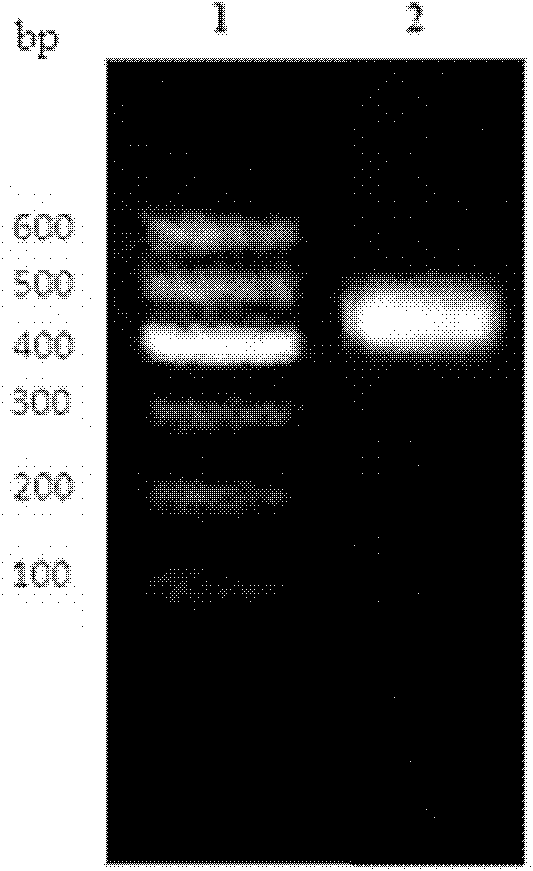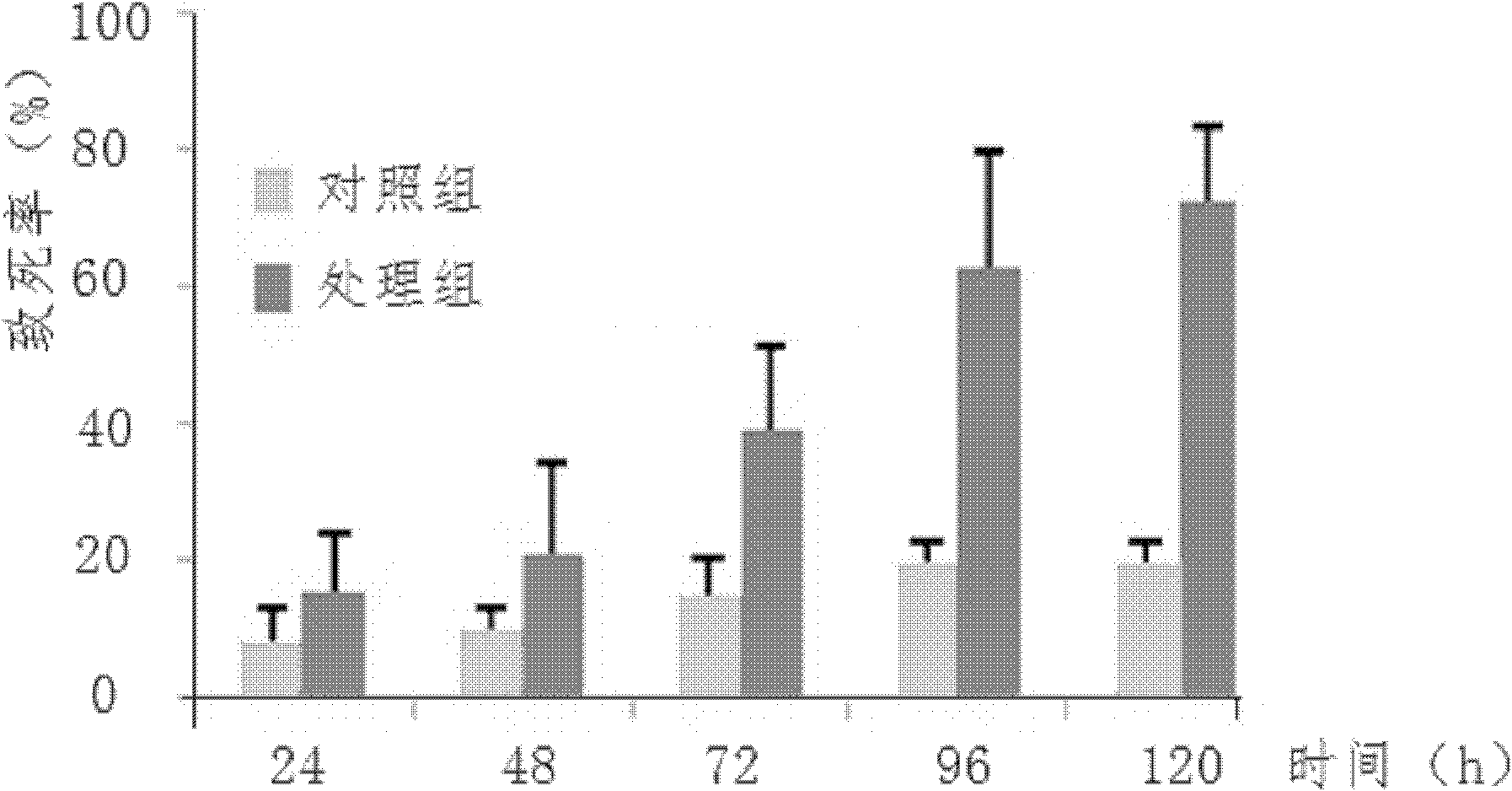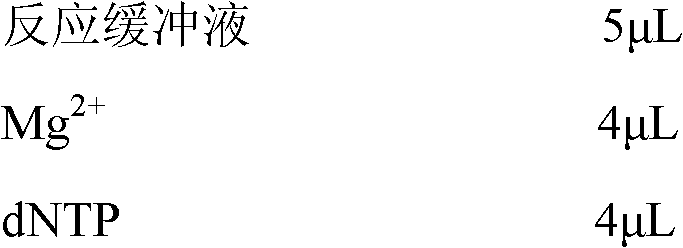Gene silencing technology-based lethal gene fragment Chitinase 7 of laodelphax striatellus and dsRNA (double-stranded RNA) thereof
A technology of gene fragment and SBPH, applied in the field of agricultural biology, can solve the problems of poor chemical control effect and environmental pollution, and achieve the effects of reducing mechanical damage, facilitating experimental operation and low synthesis cost.
- Summary
- Abstract
- Description
- Claims
- Application Information
AI Technical Summary
Problems solved by technology
Method used
Image
Examples
Embodiment 1
[0037] 1. Cloning method of Chitinase 7 gene fragment:
[0038] (1) Get 10-20 heads of SBPH, and use the TRIzol method to extract total RNA;
[0039] (2) Synthesizing the first strand of cDNA;
[0040] (3) Obtain the gene fragment sequence from the SBPH transcriptome, and after homology comparison at http: / / www.ncbi.nlm.nih.gov / , it is predicted to be the SBPH Chitinase 7 gene, using Primer premier 5.0 software design P1 and P2, amplified by RT-PCR method;
[0041] Upstream primer (P1): 5'GTGCTGCTGGATACGAT 3' (SEQ ID NO.2),
[0042] Downstream primer (P2): 5'GTCTGTAGGCGAATGGT 3' (SEQ ID NO.3);
[0043] The PCR reaction program is: denaturation at 94°C for 2min, 30sec at 94°C, 30sec at 55°C, 30sec at 72°C, 35 cycles, extension at 72°C
[0044] PCR reaction system (50μL):
[0045]
[0046]
[0047] (4) The PCR product is separated by agarose gel electrophoresis, and the target DNA fragment is recovered;
[0048] (5) Insert the recovered target fragment into the pEASY...
Embodiment 2
[0052] Embodiment 2.dsRNA synthesis and recovery
[0053] (1) According to the verified Chitinase 7 gene fragment sequence, use Primer Premier 5.0 software to design P3 and P4, and add the T7 promoter sequence TAATACGACTCACTATAGGG at the 5' end of the upstream and downstream primers;
[0054] Upstream primer (P4): 5'TAATACGACTCACTATAGGGTGCTGCTGGATACGAT 3'(SEQ ID NO.5)
[0055] Upstream primer (P5): 5'TAATACGACTCACTATAGGGTCTGTAGGCGAATGGT 3'(SEQ ID NO.6)
[0056]
[0057] PCR reaction program: denaturation at 94°C for 2min, 30sec at 94°C, 30sec at 60°C, 30sec at 72°C, 38 cycles, extension at 72°C.
[0058] (2) The PCR product was separated by electrophoresis on a low-melting point agarose gel with a concentration of 1% and observed under ultraviolet light. The results are shown in figure 1 , whose sequence is shown in SEQ ID NO.4.
[0059] (3) Using Promega's SV Gel and PCR Clean-Up System kit for recovery:
[0060] ① Cut the gel of the separated target fragment, put it...
Embodiment 3
[0070] Embodiment 3.dsRNA feeding experiment
[0071] (1) Seal one end of the glass tube with a parafilm, suck the second-instar SBPH into the glass tube with a sucker, and seal the other end with gauze;
[0072] (2) Gently pat the insects to one end with your hands, remove the gauze from the other end, and put the prepared parafilm sticker face up, pull evenly to both sides, pull it into a square, and then cover it on the glass On the nozzle of the tube, place the tube upright on the ultra-clean table;
[0073] (3) Use a pipette gun to draw 100 μl of feed and drop it in the center of the parafilm. The control group only adds feed (see Table 1 for the formula), and the treatment group adds dsRNA of the Chitinase 7 gene to the feed. The concentration of dsRNA is 3214ng / μl. A new parafilm, with the sticker side down, is attached to the mouth of the glass tube, and the feed and dsRNA are sealed between the two layers of parafilm;
[0074] (4) Put the glass tube with feed and ds...
PUM
 Login to View More
Login to View More Abstract
Description
Claims
Application Information
 Login to View More
Login to View More - R&D
- Intellectual Property
- Life Sciences
- Materials
- Tech Scout
- Unparalleled Data Quality
- Higher Quality Content
- 60% Fewer Hallucinations
Browse by: Latest US Patents, China's latest patents, Technical Efficacy Thesaurus, Application Domain, Technology Topic, Popular Technical Reports.
© 2025 PatSnap. All rights reserved.Legal|Privacy policy|Modern Slavery Act Transparency Statement|Sitemap|About US| Contact US: help@patsnap.com



